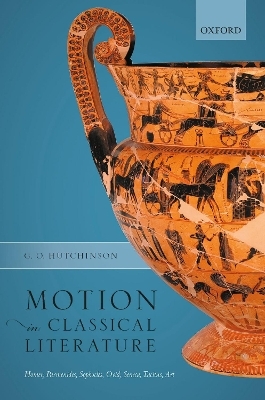
Motion in Classical Literature
Oxford University Press (Verlag)
978-0-19-885562-0 (ISBN)
Classical literature is full of humans, gods, and animals in impressive motion. The specific features of this motion are expressive; it is closely intertwined with decisions, emotions, and character. However, although the importance of space has recently been realized with the advent of the 'spatial turn' in the humanities, motion has yet to receive such attention, for all its prominence in literature and its interest to ancient philosophy.
This volume begins with an exploration of motion in particular works of visual art, and continues by examining the characteristics of literary depiction. Seven works are then used as case-studies: Homer's Iliad, Ovid's Metamorphoses, Tacitus' Annals, Sophocles' Philoctetes and Oedipus at Colonus, Parmenides' On Nature, and Seneca's Natural Questions. The two narrative poems diverge rewardingly, as do the philosophical poetry and prose. Important in the philosophical poem and the prose history are metaphorical motion and the absence of motion; the dramas scrutinize motion verbally and visually.
Each study first pursues the general roles of motion in the particular work and provides detail on its language of motion. It then engages in close analysis of particular passages, to show how much emerges when motion is scrutinized. Among the aspects which emerge as important are speed, scale, and shape of movement; motion and fixity; the movement of one person and a group; motion willed and imposed; motion in images and in unrealized possibilities. The conclusion looks at these aspects across the works, and at differences of genre and period. This new and stimulating approach opens up extensive areas for interpretation; it can also be productively applied to the literature of successive eras.
Professor G. O. Hutchinson studied at Balliol College, Oxford, as an undergraduate, then took up a position at Christ Church as a Research Lecturer. In 1984 he became Fellow and Tutor in Classics at Exeter College, Oxford, and in 1998 Professor of Greek and Latin Languages and Literature, before being appointed to the Regius Chair of Greek in 2015 and returning to Christ Church. Motion in Classical Literature is his tenth single-authored book; the others, mostly published by OUP, are commentaries on Aeschylus' Seven against Thebes (1985), a selection of Greek lyric poetry (2001), and Propertius' Elegies, Book IV (CUP, 2006), and the monographs Hellenistic Poetry (1988), Latin Literature from Seneca to Juvenal: A Critical Study (1993), Cicero's Correspondence: A Literary Study (1998), Talking Books: Readings in Hellenistic and Roman Books of Poetry (2008), Greek to Latin: Frameworks and Contexts for Intertextuality (2013), and Plutarch's Rhythmic Prose (2018).
Frontmatter
List of Illustrations
List of Abbreviations
0: Introduction
1: Visual Art
Purwias jumps
Olyseus at sea
Dexileos in action
Dionysus sails through a sea of red
Pentheus and his family
Hades abducts Persephone
A discus-thrower
Medea ponders
2: Homer, Iliad
One snake, nine birds (2.308-21)
Helen speaks her mind (3.399-412)
At the edge (5.434-44)
A stallion unbound (6.495-6, 503-14)
Goddesses kept in line (8.399-406)
Litai limping (9.505-12)
Horses fly (11.280-5, 288-90)
Beast at bay (12.37-53)
The advent of Poseidon (13.17-31)
A wave poised (14.13.-24)
The boar-like Ajax (17.274-87)
Slow survivors (19.40-53)
Apollo's trick (21.601-22.6)
The body brought back (24.703-18)
Leaping and falling from a chariot (16.726-76)
Hector waits (22.90-144)
3: Ovid, Metamorphoses
The fall of Phaethon (2.304-22)
River rage (3.566-71)
Petrification (6.301-12)
Strange seas (7.62-74)
Puzzle (7.772-86)
Isis rescues Iphis (9.780-7)
Better than heaven (10.529-36)
Snake and birds once more (12.11-18, 22-3)
Everything is in motion (15.176-95)
Defying Dis (5.391-424)
Myrrha: small steps and large (10.437-89)
4: Tacitus, Annals
The twentieth redeem themselves (1.51.3-4)
Terrain hinders, not helps (2.17.2-6)
The dead Germanicus is brought back to Italy (3.1.3-4)
Obsequious exodus (4.74.3-4)
Royal trickery (12.4.72-4)
Isolating Agrippina (13.18.3-19.1)
Startling Britons (14.30.1-2)
Fire (15.38.2-6)
Father and daughter on trial (16.32.1-2)
Tiberius meets his end (6.50)
A party does not go well (11.31.2-32)
5: Sophocles, Philoctetes and Oedipus at Colonus
Abandonment (Phil. 268-80, 287-92)
Neoptolemus must be going (Phil. 459-67)
All is to change (Phil. 712-30)
Leaving (Phil. 886-903)
Philoctetes' agonies (Phil. 779-842)
Oedipus sits on a ledge of rock (OC 195-202)
Antigone is carried off (OC 822-47)
Old age assailed from all quarters (OC 1239-48)
A journey robbed of purpose (OC 1393, 1397-1404)
Missing motion (OC 1638-52)
Oedipus arrives (OC 1-52)
6: Parmenides, On Nature
A fast ride with goddesses (B 1 Diels-Kranz, D4 Laks-Most)
Only two roads (B 2, D6)
No splitting reality (B 4, D10)
The goddess can start anywhere (B 5, D5)
A third way not recommended (B 6, D7)
Truth (B 7-8, D8)
Prefatory promises (B 10, D12)
Heavenly births (B 11, D11)
Love and rings (B 12, D14)
The inadequate moon (B 14, D27)
Thought and the limbs (B 16, D51)
7: Seneca, Natural Questions
Throwing stones (1.2.1-2)
Deceptive speed (1.14.2)
Can fire fall? (2.13.1-4)
Two active old men (3.pr.1, 4, 6)
Roundness (4b.3.3-5)
Winds got wrong (5.2)
A typology of earthquakes (6.21.2)
Comets sure and steady (7.23.2-3)
Sailing to war (5.18.5-10)
A whirlwind gets above itself (7.8.1-9.1, 10.2)
8: Conclusion
Endmatter
Bibliography
Index of Passages and Works of Art
General Index
| Erscheinungsdatum | 03.01.2020 |
|---|---|
| Zusatzinfo | 8 black-and-white illustrations |
| Verlagsort | Oxford |
| Sprache | englisch |
| Maße | 165 x 242 mm |
| Gewicht | 664 g |
| Themenwelt | Kunst / Musik / Theater ► Kunstgeschichte / Kunststile |
| Geisteswissenschaften ► Archäologie | |
| Geschichte ► Allgemeine Geschichte ► Altertum / Antike | |
| Geisteswissenschaften ► Sprach- / Literaturwissenschaft ► Anglistik / Amerikanistik | |
| Geisteswissenschaften ► Sprach- / Literaturwissenschaft ► Literaturwissenschaft | |
| ISBN-10 | 0-19-885562-1 / 0198855621 |
| ISBN-13 | 978-0-19-885562-0 / 9780198855620 |
| Zustand | Neuware |
| Informationen gemäß Produktsicherheitsverordnung (GPSR) | |
| Haben Sie eine Frage zum Produkt? |
aus dem Bereich


